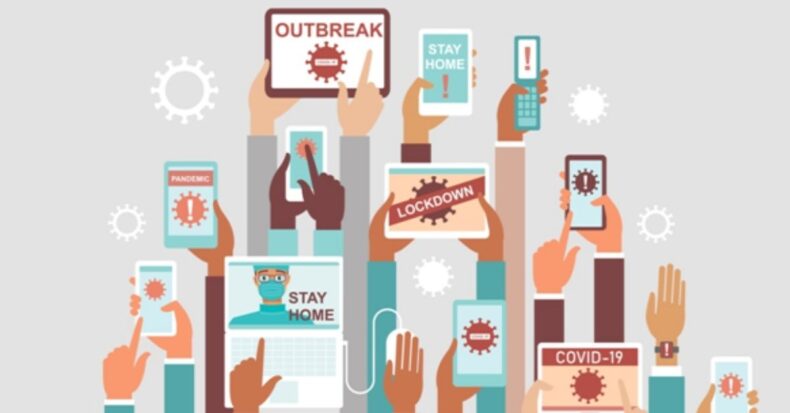Social media has made it effortless to interact with friends and family in this pandemic. However, excessive engagement in social media has also paved the way for several mental health concerns.
On a worldwide scale, social media may help people obtain information, share ideas, and connect with others dealing with similar issues.
It can also be a helpful venue for quickly relaying information amid a national or global catastrophe. Because of its global reach, social media has become a vital communication medium during the COVID-19 pandemic.
The influence in the pandemic:
Social media shifted more than a place to upload the latest vacation photographs as government health institutions utilised it to transmit current findings on prevention and treatment. It became a hub of pandemic-related information.
People are interacting online more than ever before – for example, during the initial wave of the pandemic, social media engagement soared by 61%.
For many, social media became a lifeline to the outside world, particularly as they seek ways to stay connected and entertained.
Has the usage of social media during the pandemic, on the other hand, does it harm mental health and well-being? Has it, on the other hand, had the opposite effect?
According to mental health professionals, this isn’t exactly the case. While social media can help keep friends and family connected during times of separation, users should be mindful that extended periods of mindless scrolling might be harmful to their mental health.
The current status of mental health:
Mental health concerns are on the increase, according to the World Health Organization (WHO). According to statistics, roughly 20% of children and adolescents worldwide have a mental health problem. Suicide is also the second-highest reason for death among people aged 15 to 29.
According to research by Frontiers in Psychology, there is a link between pandemic threats and widespread worry and concern among the general public.
Scientists explain that during a broad disease outbreak, some fear about personal safety and health can assist drive healthy behaviours like hand-washing and social distancing. Anxiety, on the other hand, can become overwhelming in certain people and cause injury.
Navigating social media in the pandemic
At the outset of the epidemic, the necessity for expanded connectivity was obvious. Users sought to stay connected as they dealt with a new, shared reality.
However, pandemic-related issues have subsided more than a year later. Social media feeds are reverting to many of the same old pitfalls that have made them problematic for mental health for years, such as misinformation and poorly altered photographs.
Users, particularly those who use social media more regularly, are affected by these false images. People who suffer from social anxiety, for example, are already vulnerable to the harmful effects of social media.
Initially, the thought was that persons with social anxiety would benefit from social media because it could serve as a tool for social interaction.
However, in many cases, the temptation to obtain more ‘likes’ or ‘friends’ has had the exact opposite impact. It forces socially anxious people to understand how distant they are rather than making them feel more connected.
Social media and mental health:
Furthermore, a surge in social media use creates an additional opportunity for social comparison, thanks to feeds full of doctored photographs and often overstated positive experiences.
Social media reinforces the issue of confirmation bias by perpetuating the illusion that perfectionism is feasible. When people see other users who appear to be perfect, well-liked or have items they don’t have, they begin to believe some of their unfavourable judgments.
Increased screen use has far-reaching consequences for people who struggle with social anxiety.
Despite their goals of using social media to increase connectivity, many people feel less connected than before the pandemic because there are fewer opportunities for in-person engagement. According to one experiment, using social media increases depression and loneliness.
Social media misinformation:
An abundance of misinformation on social media has also been a significant source of concern and stress for many people.
During the pandemic, the transmission of potentially dangerous information became so widespread that numerous websites, including Facebook and Twitter, began flagging and, in some cases, removing content that was not on facts.
Despite these attempts, social media users continue to bombard photos, stories, and postings that promote misinformation and add to the high level of anxiety.
Next steps:
Social media platforms significantly influence how their products affect their users’ mental health and well-being. Limitation of time and content consumed, and intentionality plays a vital part in reaping the benefits and reducing the downsides.
However, [using] most of these will minimise addictiveness, engagement, and time spent, which frequently goes against the platform’s stated goals.













